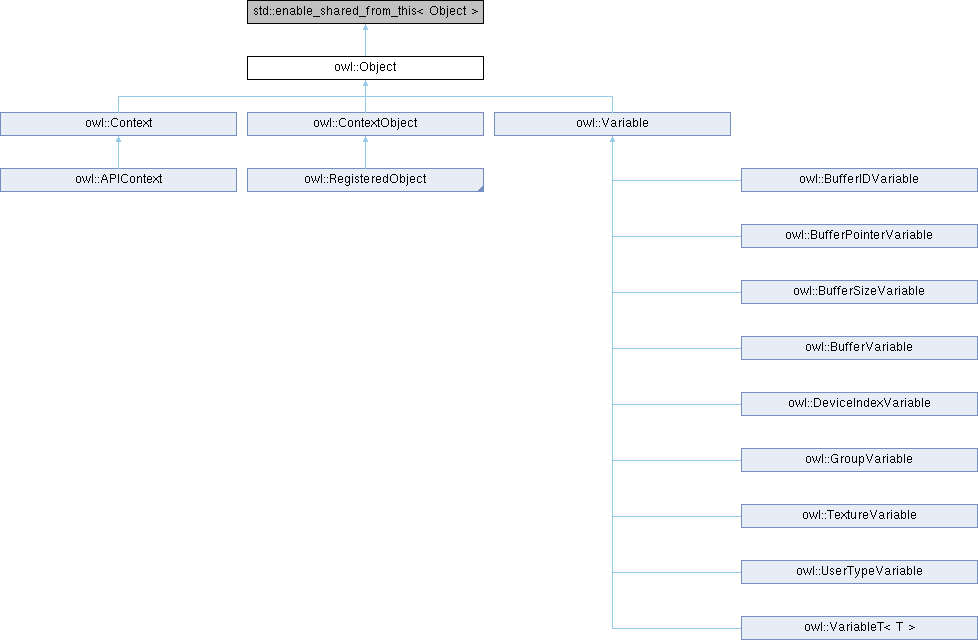#include <Object.h>

Classes | |
| struct | DeviceData |
Public Types | |
| typedef std::shared_ptr< Object > | SP |
Public Member Functions | |
| Object () | |
| virtual std::string | toString () const |
| virtual DeviceData::SP | createOn (const std::shared_ptr< DeviceContext > &device) |
| void | createDeviceData (const std::vector< std::shared_ptr< DeviceContext > > &devices) |
| template<typename T > | |
| std::shared_ptr< T > | as () |
Public Attributes | |
| const size_t | uniqueID |
| std::vector< DeviceData::SP > | deviceData |
Static Public Attributes | |
| static std::atomic< uint64_t > | nextAvailableID |
Detailed Description
common "root" abstraction for every object this library creates
Constructor & Destructor Documentation
◆ Object()
| owl::Object::Object | ( | ) |
constructor
Member Function Documentation
◆ as()
|
inline |
pretty-typecase to all derived classes
◆ createDeviceData()
| void owl::Object::createDeviceData | ( | const std::vector< std::shared_ptr< DeviceContext > > & | devices | ) |
creates the actual device data for all devies,by calling
- See also
- createOn() for each device
◆ createOn()
|
virtual |
creates the device-specific data for this group
◆ toString()
|
virtual |
pretty-printer, for printf-debugging
Reimplemented in owl::GeomGroup, owl::LaunchParamsType, owl::SBTObject< ObjectType >, owl::SBTObject< GeomType >, owl::SBTObject< LaunchParamsType >, owl::SBTObject< MissProgType >, owl::SBTObject< RayGenType >, owl::UserGeomGroup, owl::Variable, owl::APIContext, owl::Buffer, owl::DeviceBuffer, owl::HostPinnedBuffer, owl::ManagedMemoryBuffer, owl::GraphicsBuffer, owl::Context, owl::CurvesGeomType, owl::CurvesGeom, owl::CurvesGeomGroup, owl::GeomType, owl::Geom, owl::Group, owl::InstanceGroup, owl::LaunchParams, owl::MissProgType, owl::MissProg, owl::Module, owl::ContextObject, owl::RayGenType, owl::RayGen, owl::SBTObjectType, owl::SphereGeomType, owl::SphereGeom, owl::SphereGeomGroup, owl::Texture, owl::TrianglesGeomType, owl::TrianglesGeom, owl::TrianglesGeomGroup, owl::UserGeomType, and owl::UserGeom.
Member Data Documentation
◆ deviceData
| std::vector<DeviceData::SP> owl::Object::deviceData |
the list of per-device data for this object - should be exactly one per GPU in the context
◆ nextAvailableID
|
static |
atomic counter that always describes the next not yet used unique ID, which we can use to fill in the Object::uniquID values
◆ uniqueID
| const size_t owl::Object::uniqueID |
a unique ID we assign to each newly created object - this allows any caching algorithms to check if a given object was replaced with another, even if in some internal array it ends up with the same array index as a previous other object
The documentation for this struct was generated from the following files:
- owl/Object.h
- owl/Object.cpp